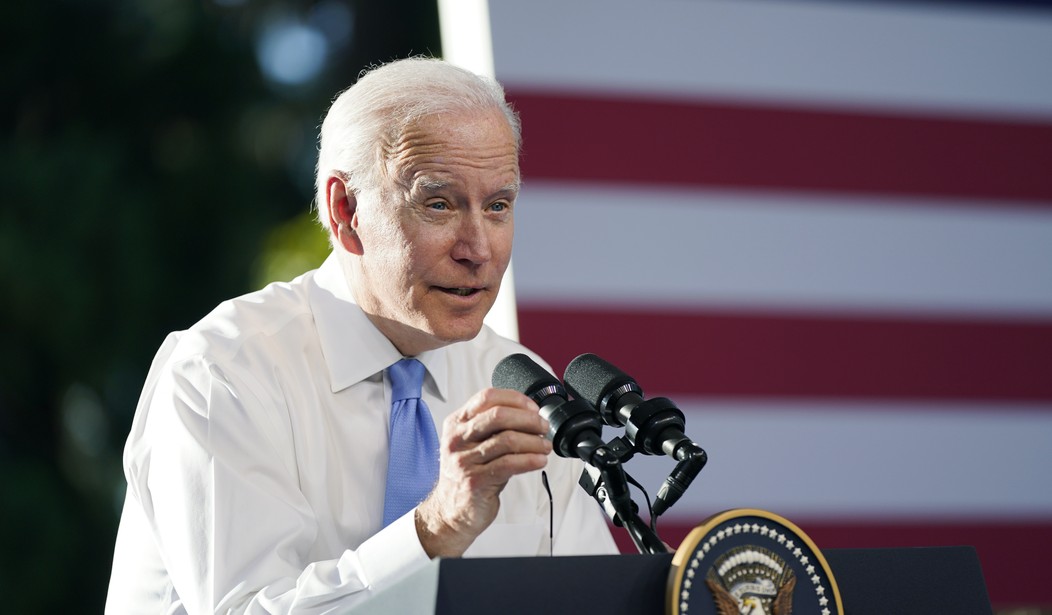On Friday, we told you about an apparent bait and switch from President Biden and Speaker Pelosi on a bipartisan infrastructure framework hammered out in the Senate. After hailing and endorsing the agreement, Biden promptly announced that he wouldn't sign it into law unless it was delivered in tandem with a party-line "reconciliation" package, featuring massive additional spending. Pelosi affirmed the stance, vowing not to move on the bipartisan legislation until the upper chamber had already passed a (likely Democrat-only) bill. This angered Republicans who'd negotiated the cross-aisle proposal in good faith. They'd always known Democrats would still have a reconciliation vehicle at their disposal, but never agreed that the two bills would be linked, or that the sequencing would require all the spending at once. In fact, Sen. Joe Manchin said earlier this month that one should not be conditional on the other:
Manchin said of bipartisan package on June 16: "It should not be conditional” on reconciliation passing. https://t.co/Dm7f5Z1PSM pic.twitter.com/lTxO6P9eWH
— John McCormack (@McCormackJohn) June 25, 2021
Many Democrats and media members claimed that GOP objections to the new order of operations demanded by Biden and Pelosi were performative; this had always been the plan, they insisted. But that revisionism was undermined by the president's statement over the weekend "clarifying" that he was not in fact threatening to reject the bipartisan plan if it's not paired with his "family" plan (i.e., the part that Democrats will use reconciliation to try to pass):
I don’t understand this Biden statement because I was told yesterday by many very smart people that he’s always been crystal clear about his intentions and that nothing he said Thursday should have surprised anyone pic.twitter.com/SXoU2xjJAB
— Ryan Lizza (@RyanLizza) June 26, 2021
Biden writes that it was "not my intent" to have "created the impression" that he wouldn't accept the bipartisan infrastructure deal absent the other bill. He says he still endorses the standalone infrastructure agreement "without reservation or hesitation," even as he'll push Congress to enact more of his proposed spending. The statement is notably vague on timing and sequencing, and it's also unclear whether Pelosi will go along with Biden's new(?) approach – having already stated that she won't take up any bipartisan infrastructure legislation until after the reconciliation bill has already passed. Over in the Senate, Mitch McConnell is pressing Pelosi and Schumer to make the de-linkage explicit, citing the president's statement. And strangely, even after putting out the convoluted statement above, the White House is still struggling to answer basic questions about what Biden actually supports:
Recommended
On CNN, Cedric Richmond won't answer whether Biden would sign the bipartisan infrastructure bill if it lands on his desk without the reconciliation package. "I don't think it's a yes or no question," he tells @jaketapper
— Kevin Liptak (@Kevinliptakcnn) June 27, 2021
Twice, Wallace asks whether Biden will sign the infrastructure bill even if Dems don't get the full reconciliation bill.
— Will Saletan (@saletan) June 27, 2021
"If he gets the infrastructure bill, he is going to sign [it], no if, ands, or buts? No conditions?"
Twice, @Richmond46 ducks, saying Biden will sign both.
If you're confused, you're not alone. And in case you're curious why Republicans are so eager to see the two bills totally decoupled, look no further than these comments from Manchin:
The ducks are NOT lined up for quick passage of a reconciliation bill https://t.co/5c7GAg5p42
— Bill Scher (@billscher) June 27, 2021
QOTD: “If they think in reconciliation I’m going to throw caution to the wind and go to $5 trillion or $6 trillion when we can only afford $1 trillion or $1.5 trillion or maybe $2 trillion and what we can pay for, then I can’t be there," Manchin said on “This Week.”
— Liam Donovan (@LPDonovan) June 27, 2021
If the infrastructure plan is passed first and separately, that eliminates some of the incentives for more moderate Democrats to go along with yet another massive spending bill – and increases leverage among those who may want to pare things back a bit. Linking the two bills is an all-or-nothing power play. Manchin is telegraphing what his range is ($1-2 trillion), which indicates that there will be another giant spending bill, but perhaps not quite as giant as many progressives would like. As I mentioned in my analysis last week, the bipartisan infrastructure compromise, plus a somewhat restrained (a relative term) "human infrastructure" plan passed exclusively by Democrats, may be the least bad outcome here. And if the former comes first, all the squabbling about the latter will be internecine among the Democrats. I'll leave you with this wry comment about Biden's damage control:
In a way, that’s true. He didn’t “suggest” it, he said it. https://t.co/QdsVobh0Ea
— Brit Hume (@brithume) June 26, 2021

























Join the conversation as a VIP Member